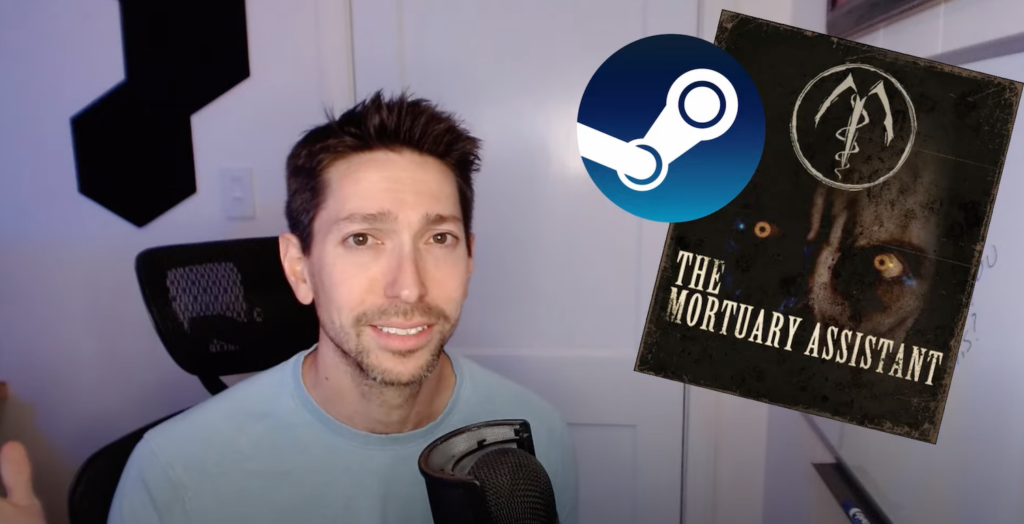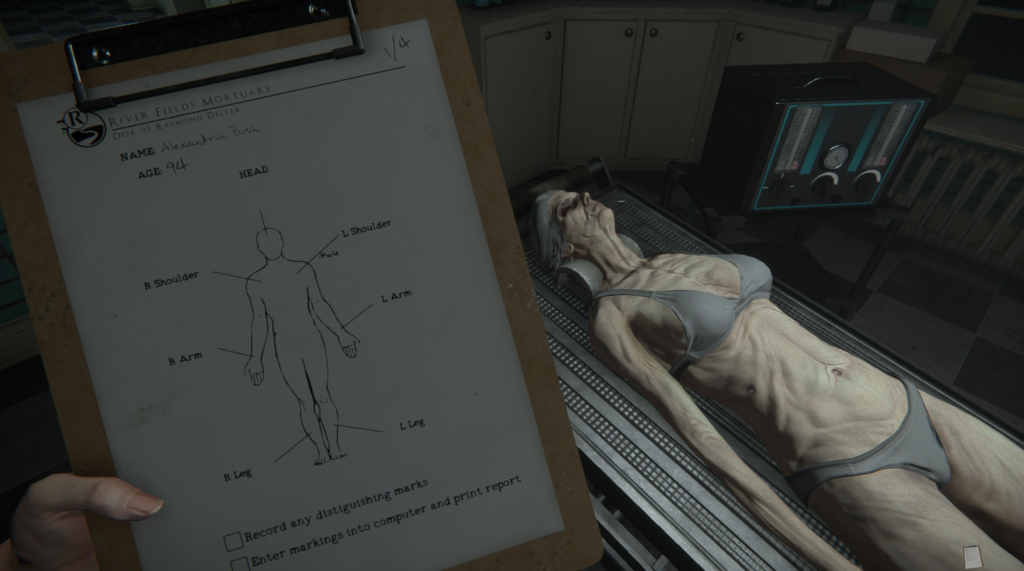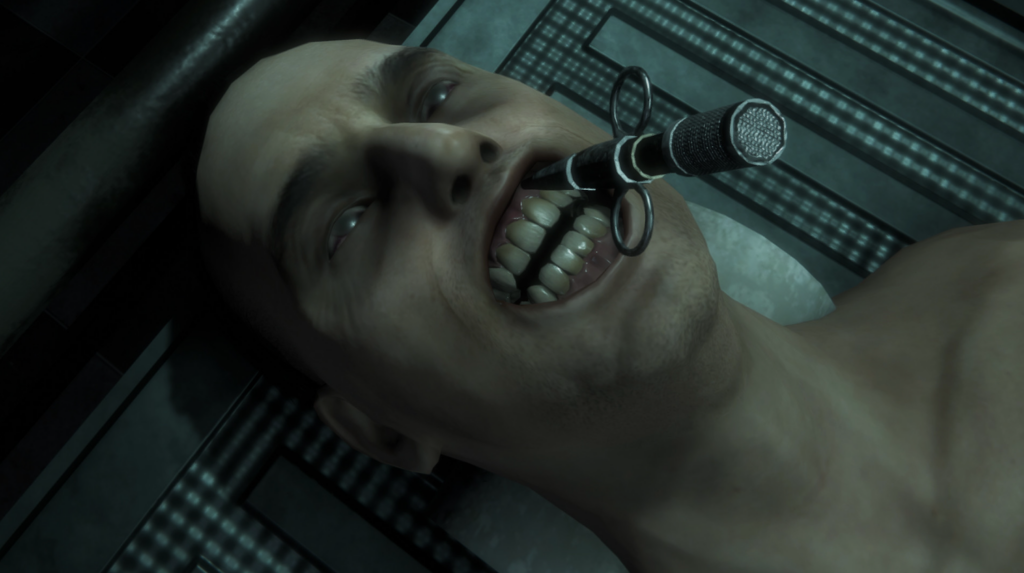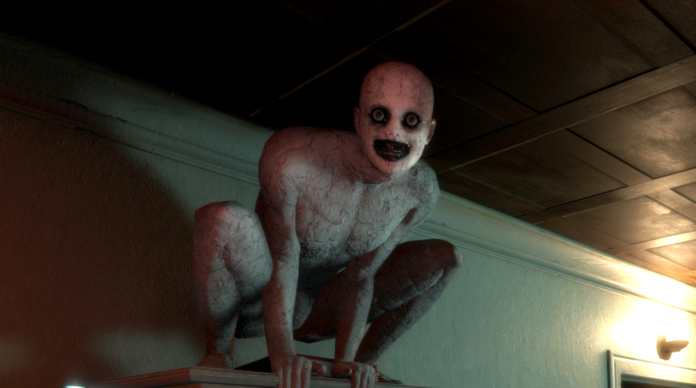Brian Clarke spent over 13 years working in triple A studios like EA Mythic, Trion, and Disney before he ‘wanted to do something really dumb’ and became a solo indie game developer. He’s been steadily working on a portfolio of horror games since 2018, operating under the name Darkstone Digital. His latest game The Mortuary Assistant came out in August and is scaring players and critics alike.
Although he enjoys the freedom of being a solo dev, he also feels the pressure of having to deliver. “You’re extremely close to it and personally invested to a point where if you are not able to take a step back and seriously assess what you are making, you could end up with a game that falls flat and leaves you, honestly, sort of heart broken.”
Why did you become a solo developer?
“So I’ve been very fortunate and have had a great career in AAA game development for about thirteen years. I started as an artist and, over time, bounced around various leadership roles. I had set out to be an art director which I eventually got to do. After that, I decided I wanted to focus on being a part of cool projects.”
“Eventually, I started at Disney working as an art lead on a Star Wars title which was a big thing for me. After a few years at Disney, I thought about what I wanted to do. I had achieved a lot of what I wanted and the idea of chasing titles and specific game projects didn’t appeal to me as much. I really wanted to make my own. I also really love horror which a lot of AAA studios wont take a gamble on. That’s when I decided I wanted to do something really dumb and become a solo indie developer.”
What are the biggest advantages of working solo?
“You have complete freedom. There is a lot of management in AAA and a lot of moving parts. You push hard to leave your mark on a project but your main responsibility is to finish your tasks so your portion of the game is complete. You still feel a lot of pride in the games you ship but you are very tied down to your set of responsibilities. Being solo lets me choose what I want to work on next. I get to write the story, build the world, and what you have created when it’s all said and done is a piece of yourself. That’s something I don’t think many jobs offer.”
What are the biggest pitfalls of working solo?
“Everything. Just as you have complete freedom, you are also responsible for every moving part which means you need to stay motivated. Your vision needs to be clear. You need to be your own manager. If the writing is bad, it’s on you. If a mechanic isn’t fun, it’s on you. The advantage of the final product being a piece of yourself is also its largest disadvantage. You’re extremely close to it and personally invested to a point where if you are not able to take a step back and seriously assess what you are making, you could end up with a game that falls flat and leaves you, honestly, sort of heart broken.”
you could end up with a game that leaves you sort of heart broken
“The money to support yourself is difficult to come by unless you want to pitch to a publisher. You also need to own all the tools required to make your game and be proficient in all of them. What this all boils down to is there is no other member to help fix something that is broken. The buck stops with you and all these different aspects bring their own pressures. Staying motivated is extremely hard in those circumstances and I have massive respect for anyone who can shoulder that.”
How does your creative process work?
“I often brainstorm by myself. If I’m in the middle of a project when I have an idea, I simply take a small note about it then get back to work. I don’t want to risk being distracted by the new shiny idea. Once I’m free to work on something, I usually start with a story and setting as I am a huge believer that things will more easily fall into place with lore behind it all. It’s never anything robust, just a basic idea like a wizard who lives in a sewer and needs to fix the breaking sewage system below unknown to everyone above. That sort of thing. Then, I’ll usually start thinking in parallel both broad stroke game concepts that support the story and story that supports the game concepts.”

“Then, I usually sleep horribly going to bed with various game issues in my brain. I’ll wake up at 3am and start working through problems. I don’t really care for that part and am trying to fix that.”
How do you stay motivated through (years of) development?
“I think the most important thing that keeps me motivated is a schedule. I know that’s not a particularly attractive answer but I feel like the only way to reach your goals is to have a path to get to them. Whenever I find myself losing motivation, I know it’s because I don’t have a clear picture of what’s next for the project. When you see your target clearly, you can easily push towards it. So if I’m starting to lose steam, I will take a step back and try to reassess my schedule. I’ll take a look at larger goals and break them down into smaller goals and from there, I’ll break them down into tasks for me to do. I think keeping tasks small and manageable is important.”
the only way to reach your goals is to have a path to get to them
“If my goal is simply ‘finish the game’ I’ll be spinning my wheels forever with no end in sight but if I break it down into smaller goals like ‘Build level one’, then break that down into smaller tasks like ‘model forest assets’ and break it further down into individual tasks like ‘model four trees’ I know I have a goal that I can understand and focus on. I no longer have to focus on ‘finish the game’ because my task for right now is ‘model four trees’. I can manage that and when I complete it, I feel like I accomplished something and that’s what I feel keeps you motivated is knowing you have completed a task that gets you further. You’ve made something you can look at and call done which propels you into the next task. So whenever I find myself losing motivation, I go back to the schedule.”

Will you ever work in a team or is it only solo for you?
“I may work in a team again at some point but I have spent so much time working on larger teams that it’s nice to have some freedom. I do have some things happening with my publisher (DreadXP) in a sort of team capacity but it is not a project of my own. I’m helping manage aspects of their project. As far as my own projects, I think I’ve had some good success on my own and would like to see where I can take it. I’m not against working with others again but, for now, things feel good. It’s really hard to beat the freedom solo development awards you both in development and your personal life.”
The mortuary Assistant is truly a scary game with some seriously disturbing imagery. How do you make a horror game by yourself?
“I think I’ve gotten a bit desensitized over the years which makes developing horror games fine but it also makes me second guess the things I make. I am constantly worried that what I’m making is not scary. Though most of the time, I’m able to look at something I’ve created and tell if it’s compelling. Overall, I can still tell if the atmosphere feels good or if what I’ve created is creepy. I think the main difference is that when something is successful, instead of being scared or creeped out by it, I just like it. Maybe that’s messed up.”

The toll on your mental health can be quite high as a solo developer. How do you deal with that?
“Absolutely. As I mentioned earlier, you’re putting a piece of yourself out there. I’ve often equated putting out a solo project to showing the world your highschool journal. It’s extremely personal and you hope no one laughs at you for it. Solo devs aren’t big faceless businesses and we have no buffer between the player and ourselves. Things like bugs, crashes, angry players, negative reviews all hit harder when it’s just you so it’s important to be ready to deal with that. This is all aside from sales and whether or not you will be able to continue making games and the toll it takes on your personal life.”
we as Solo devs have no buffer between the player and ourselves
“The best way I feel to deal with that is to find your outlets. A large one is trying to stay healthy. Being in good shape helps fight off a lot of issues both mental and physical that can come from lots of time at a computer. But I also found a lot of support in building a small community through streaming development and twitter. Maybe it sounds a bit sad but it became my social outlet for a lot of development. When you find people who do what you do or are fans of it all, you have people to talk to and often find that you aren’t alone in the struggle. I think that helps a lot.”

